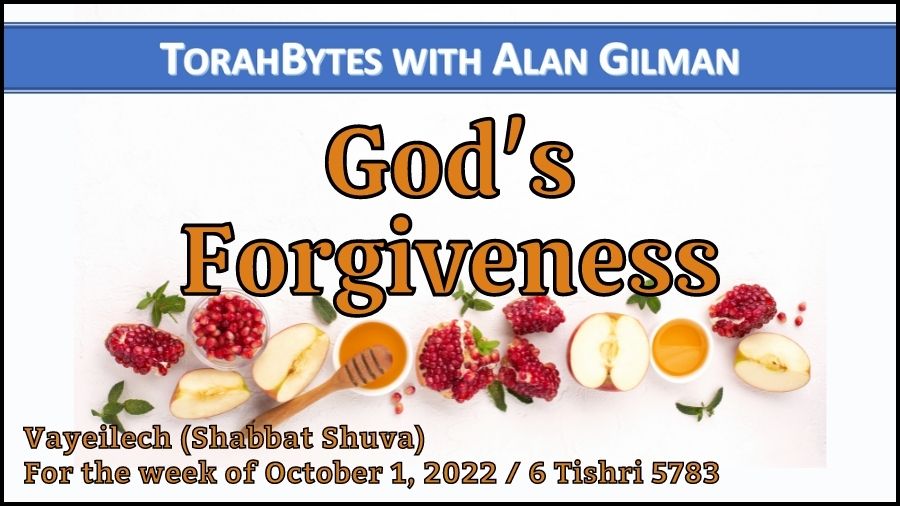For the week of October 1, 2022 / 6 Tishri 5783

Vayeilech (Shabbat Shuva)
Torah: D’varim/Deuteronomy 31:1-30
Haftarah: Hosea 14:2-10 (English: 14:1-9); Micah 7:18-20; Joel 2:15-17
Download Audio [Right click link to download]
Who is a God like you, pardoning iniquity and passing over transgression for the remnant of his inheritance? He does not retain his anger forever, because he delights in steadfast love. He will again have compassion on us; he will tread our iniquities underfoot. You will cast all our sins into the depths of the sea. (Micah 7:18-19)
We are currently in the High Holiday season, particularly what is called, “the Ten Days of Awe,” the time between Rosh Hashanah (the Jewish new year, the biblical Feast of the Blowing of the Shofar) and Yom Kippur (the Day of Atonement). The Haftarah readings this week are composed of excerpts from three Hebrew prophets and are in keeping with the themes of the season.
For some reason, I was struck by the concept of God’s forgiveness last week. It’s not as if I had done anything seriously wrong at the time. I was heavily burdened over wondering if something I had said or done was the right thing or not. I do struggle with perfectionist tendencies and an inordinate desire for other people’s approval. Some of you can relate, I am sure. “Should I have said that? What are they thinking? I am sure it was the right thing to do, but I probably could have done better. Perhaps if I had said it differently. But am I responsible for how other people react or perceive me?” Exhausting!
Then the thought came to me: I am forgiven. God forgives me. I am not saying that I shouldn’t take responsibility if I had done something truly wrong. Believe me, I am not saying that! It’s that I was impressed by how, objectively speaking, my life rests upon a foundation of forgiveness. Because of what God has done for me through the sacrifice of the Messiah, I am right with God. You might think that’s pretty easy to say especially for someone biblically and theologically savvy like myself. But in the moment, it’s as if I saw it – vividly saw it – for the first time.
The picture that came to me was that because I was right with God, I was fundamentally right with the universe. Sorry if that sounds too mystical but stay with me for a second. The term “sin,” is a biblical concept to describe the way human beings fail to meet God’s standards. It’s something we do (or don’t do) that is rooted in that part of our nature that’s been inherited from the beginning when our first parents, Adam and Eve, disobeyed God. The result of sin is God’s cursing of the human family and the entire creation in which we live. It’s as if everything is tainted or broken as a result of human rebellion against God.
When Messiah came and presented himself as a perfect sacrifice for sin, he repaired the brokenness effected by the curse. Since then, history has been in a process of renewal that will culminate upon his return, when he will judge all who have ever lived and will fully establish God’s reign forever. Trusting in the Messiah reconciles us with God and connects us to God’s restorative power. While we continue to interact with the world’s current broken state, it’s as if we do so within the context of the final restoration now.
Forgiveness releases the believer from the control and effects of sin. Sin no longer defines who we are or determines our destiny. The barriers between us and God have been removed. As a result, the resources of heaven, God’s goodness and power, are at our disposal. Our restored relationship with God changes our relationship to the entire creation. While the broken creation will continue to give us trouble, because of God’s forgiveness, it needn’t have the upper hand in my life. God isn’t holding my sin against me any longer. Instead, his love and presence are guaranteed no matter what happens.
The prophet Micah foretold that God would “cast all our sins into the depths of the sea” (Micah 7:19). It is from this that the custom of “tashlikh” is derived. Usually preformed on the first day of Rosh Hashanah, people go to a flowing body of water and take food, usually bread, and cast them from their pockets into the water to symbolize God’s casting our sins into the depths of the sea. That wasn’t the picture I had in mind, last week, but it’s a good one. Because God himself has cast away our sins, we needn’t be burdened by them anymore.
Scriptures taken from the English Standard Version